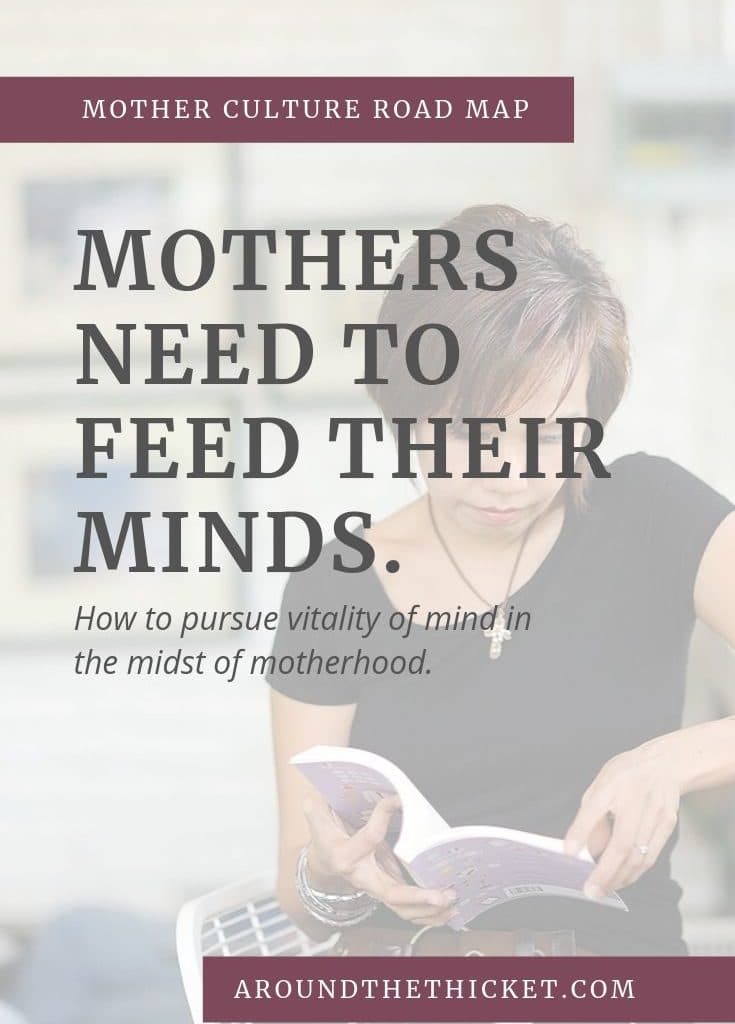Mothers need to feed their minds.
Sometimes, I find motherhood is a bit mind-numbing. Maybe it’s particularly related to having young children: there is a lot of repetition. Repeating instructions, repeating tasks, repeating stories, repeating games. It is a special sort of exhaustion. It is hard to do the same thing, over and over again. It’s little wonder that when the children go to bed at 8:30, I’m ready for bed, too.
Being tired at the end of the day isn’t surprising, and perhaps isn’t a bad thing. It is not a sign of failure that my mind and body have limits and needs to rest, after putting it to good use all day. But there is a difference between feeling tired and feeling like my brain has turned off. Tired suggests that I have been working hard. The other, zombie-like feeling suggests that my mind isn’t working at all.
Our minds require ideas.
But what can we do about this mind-numbing fatigue? Simply put, we need to provide our minds with something that will nourish and sustain them, like our bodies are nourished and sustained on food. Charlotte Mason teaches that a mind’s proper food is ideas.
If we stop eating, our bodies stop functioning properly. If we stop taking in ideas that prompt reflection, rumination, and deep thought, we shift into that ‘numbed’’ state. Our minds are starving. Unlike tiredness, which shows that our bodies have been doing what they ought, numbed fatigue is a sign that our minds have stopped doing what they ought. Our responsibility, then, is to nourish our minds as we would our bodies, with regular meals of nutritious food.
We get some ideas from our atmosphere – by watching those around us, speaking with them, and receiving inspiration. We may also find ideas in the natural world around us (“Consider the ant!”). However, we don’t need to leave the nourishment of our minds completely to chance. We can seek ideas deliberately by reading living books.

Living books nourish our minds.
A living book: a book, well-written, that contains ideas that capture our attention and interest. When we ruminate over the ideas in a book, whether it is fiction or nonfiction, we are effectively ‘digesting’ that knowledge. As with our body digesting food, this mental digestion sustains the life of our minds.
Resigning the life of our minds to what we pick up ad-hoc as we move through life would be like an athlete showing up to a big race and hoping that there will be a vending machine with something that will fuel her for a marathon. No real athlete would leave her race-day nutrition to chance, but would thoughtfully consider what she needs to take in in order to run at her peak.
Our minds, like our bodies, will be all the healthier and more robust for proactive, systematic reading of living books and the taking in of living ideas.
The Mother Culture Book Stack
Fortunately, we don’t have to hope for the vending-machine equivalent of mind-food. Technology makes living books (and lists of living books) available in wide abundance. We can actually find ourselves overwhelmed with options. I know my personal reading stack has occasionally threatened to topple over on my nightstand.. So what are our filters? How do we discern where to focus our time and efforts? Charlotte Mason gives us strong, guiding principles here.

1. Variety
Eating the same thing every day is not good for your health. In fact, you are almost certain to end up deficient in key nutrients which could result in serious health problems. This principle holds with reading. We should strive to read from many subject areas and many types of books. Novels, poetry, short stories, biographies, science, history. The genres and subject of books we could read is endless. Just like with food, we may find some of these unpalatable, but it’s still worth dipping in occasionally to see if your tastes have changed (I managed to make myself like eggs this way).
2. Abundance
Consider what happens when there is not enough food. The body starts to cling to every calorie. Our hunger drives us to unhealthy binges when food is available. We crave sugar to give us a quick boost. We lose touch with our healthy sense of hunger.
When Charlotte Mason says that we need an abundance of living ideas, it’s not that we strive to have a thousand unread books in our house. (Although if we do, the ideas in them are not going to spoil.) Instead, abundance stands in contrast to scarcity. There is enough around us to meet our needs – enough to keep us from craving twaddle, the sugary snacks of the literary world.
3. Literary Form
The final principle for a ‘mother culture book stack’ is that the books in it should be of literary quality. They should be well-written. That doesn’t mean that they are high brow or use big words – although they might. Charlotte Mason recognized that good writing can capture attention in a powerful way. When you aren’t distracted by poor writing, or overly fancy writing, you are more likely to connect to the writing and take away ideas from it.
The Living Mind
Education is a life – a life of the mind. Far from the mind-numbing drudgery that can often accompany housekeeping and raising young children, our minds become places of vitality. But this vitality doesn’t come by-the-way. It takes some amount of thought, a bit of effort, and then discipline to assemble a list, procure books, and make time to read them. This process, along with building good habits and the effect of the atmosphere we live in, are the means by which we become more educated.



2 Comments